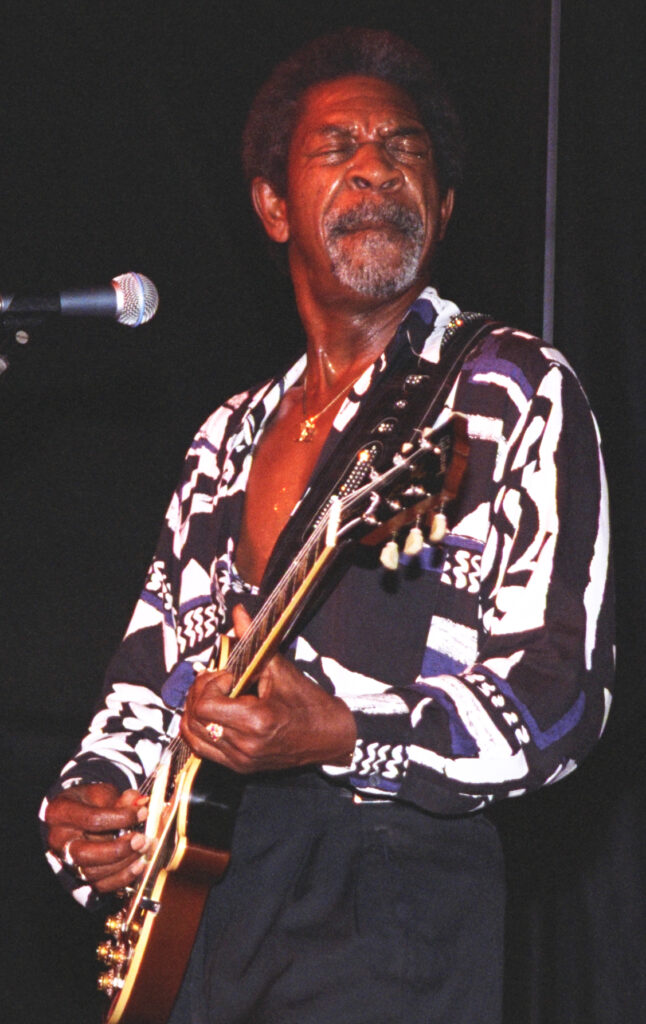Luther Allison – A Complete Biography
Introduction
Luther Sylvester Allison (August 17, 1939 – August 12, 1997) was a fiercely passionate and dynamic blues guitarist and singer whose career bridged the electric Chicago blues tradition and a modern, international blues audience. Known for a sharp, biting guitar tone, powerful vocals, and marathon live shows, Allison carved out a reputation for intensity and heart — a performer equally at home in smoky South Side clubs and on big European stages. Over a career that spanned four decades, he recorded for several labels, earned multiple blues awards, and became a touchstone for younger guitarists who followed his visceral, expressive style.

Childhood
Luther Allison was born in Widener, Arkansas, the fourteenth of fifteen children in a musical, working-class family. Raised in the cotton-country rhythms of the Arkansas Delta, he grew up hearing gospel and the early blues that would later inflect his playing. His family moved to Chicago in 1951 when Luther was about twelve, part of the Great Migration of African American families seeking economic opportunities in northern industrial cities. In Chicago, the young Allison was immersed in the vibrant South Side music scene: gospel singing at home and church, and the electric blues spilling out of neighborhood clubs. He learned to play guitar largely by ear and through close contact with family members who were musicians; by his mid-teens he was already playing with local bands.
Youth
As a teenager and young adult in Chicago, Allison absorbed the city’s rich blues environment. He began sitting in with bands and performing in clubs, eventually forming his own groups with brothers and friends. His early professional experience included bar gigs, local dates, and the hard lessons of life on the road. In the late 1950s and 1960s Allison recorded sporadically and built a reputation as a tough, soulful player — passionate but not yet fully recognized by the mainstream recording industry. During these years he developed the muscular, expressive guitar phrasing and searing vocal delivery that would come to define his style. Europe also beckoned early on; like several American bluesmen of his generation, Allison found receptive audiences overseas, and tours in Europe would become an important part of his career.
Adulthood (career development and comeback)
Throughout the 1970s and early 1980s Allison lived and worked both in the United States and in Europe, at times establishing a semi-permanent base in France. He recorded albums for labels such as Delmark, Blind Pig, Ruf, and Alligator, each label capturing different phases of his musical evolution. The 1980s albums began to bring renewed attention, but it was the 1990s that saw a significant career renaissance. Signing with Ruf Records in Europe and then with Alligator Records in the U.S., Allison released Soul Fixin’ Man (1994) and later Blue Streak, albums that showcased both his deep blues roots and a more contemporary production that broadened his audience.
Allison’s live reputation — the stamina, the emotional urgency, and the intensity of his guitar work — made him a favorite at festivals and venues around the world. He won multiple blues awards during the 1990s and enjoyed a wave of critical acclaim in the years just before his death. Musicians and critics praised him not only for technique but for the raw honesty of his performances: Allison played like someone needed to say something important through his instrument.
Major compositions and recordings
Luther Allison’s recorded legacy is broad and includes studio albums, live records, and standout songs that showcase different sides of his artistry. Key records include his Delmark era recordings, the Blind Pig release Serious (1987), the Alligator-era Soul Fixin’ Man (1994), and his last studio album, Reckless (1997). Songs such as “Cherry Red Wine” became signature numbers in his later repertoire; his albums mixed originals and reimagined blues standards, always delivered with a personal and immediate intensity. In concert, Allison was also known for extended, emotionally charged performances of both new material and classic blues pieces, where improvisation and vocal pleading would push songs into cathartic territory. His son, Bernard Allison, would later carry elements of his father’s style forward into his own recording career.
Death
In the summer of 1997, while on tour, Luther Allison sought medical attention for dizziness and coordination problems. Doctors discovered a malignant lung tumor that had metastasized to his brain. He began radiation therapy in mid-July, but his condition deteriorated rapidly. Allison died on August 12, 1997, in Madison, Wisconsin, five days before what would have been his 58th birthday. His death was widely mourned, and the blues community remembered him as one of its most impassioned performers. Posthumously, Allison’s contributions continued to be recognized; he was inducted into the Blues Hall of Fame and remembered as a bridge between classic Chicago blues and modern blues audiences.
Conclusion
Luther Allison’s life tells a story common to many great blues artists: early roots in rural America, migration to an urban music center, decades of hard work and relative obscurity, and finally wider recognition when the world was ready to hear him. What set Allison apart was the unflinching emotional honesty of his performances and the ferocity of his guitar playing. He combined gospel-born feeling, the rawness of Delta and Chicago blues, and an international sensibility shaped by years in Europe. Though his life was cut short by illness, the devotion of his fans, the musicians he influenced, and the recordings he left behind have kept his music alive. For listeners discovering him today, Allison’s recordings offer a blend of searing solo work, aching vocals, and songs played as if each performance could purge the world of some small wrong — a fitting legacy for a true bluesman.

Comments are closed